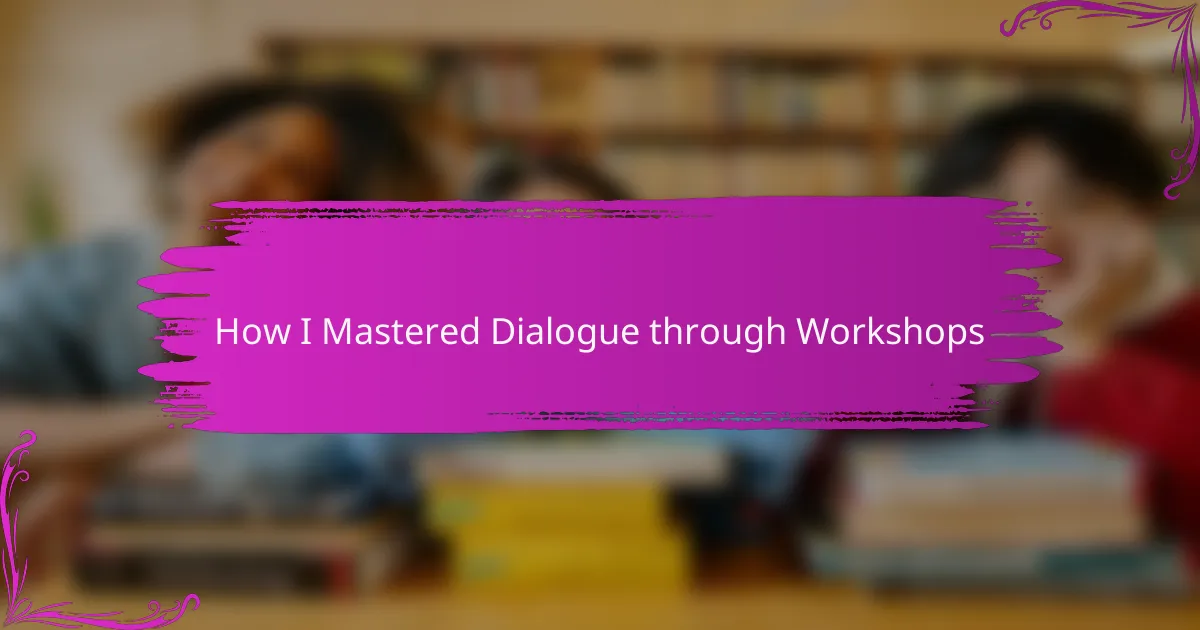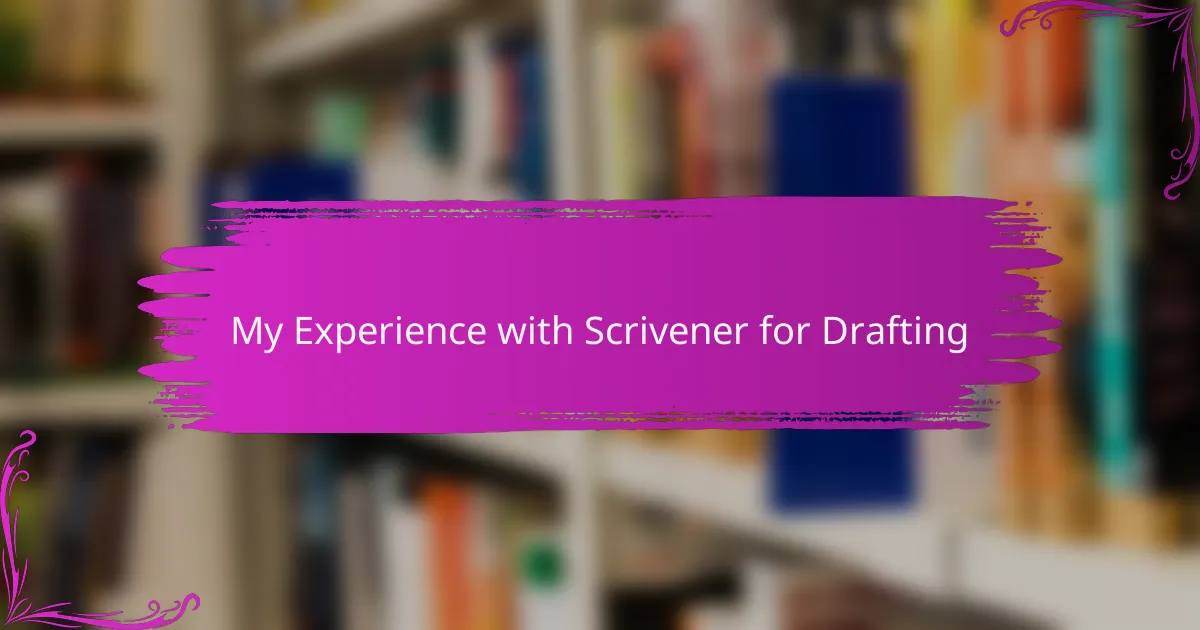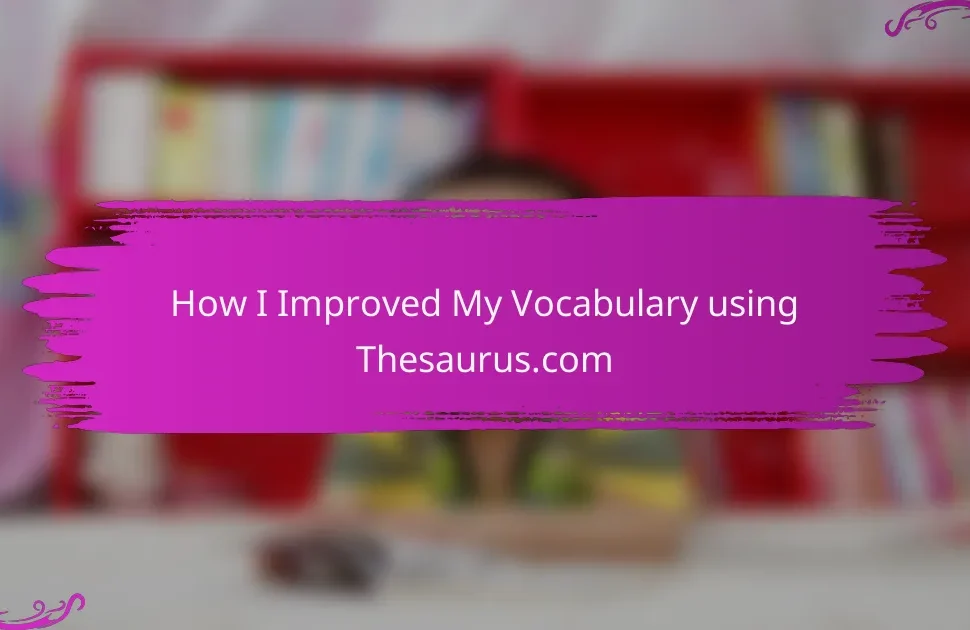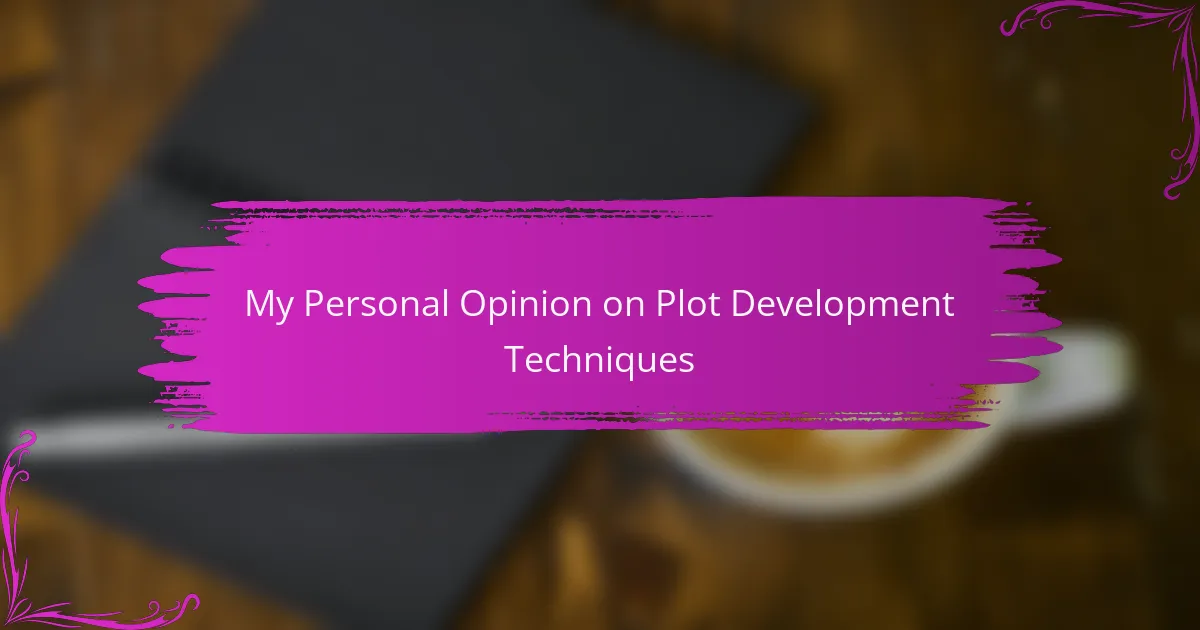Key takeaways
- Authentic dialogue captivates readers by reflecting real emotions and motivations, enhancing character development.
- Workshops foster collaboration and provide practical feedback, significantly improving writing skills through shared experiences.
- Key skills like active listening, concise expression, and emotional resonance are essential for crafting impactful dialogue.
- Utilizing diverse resources such as books, online courses, and writing prompts supports continuous improvement in dialogue writing.
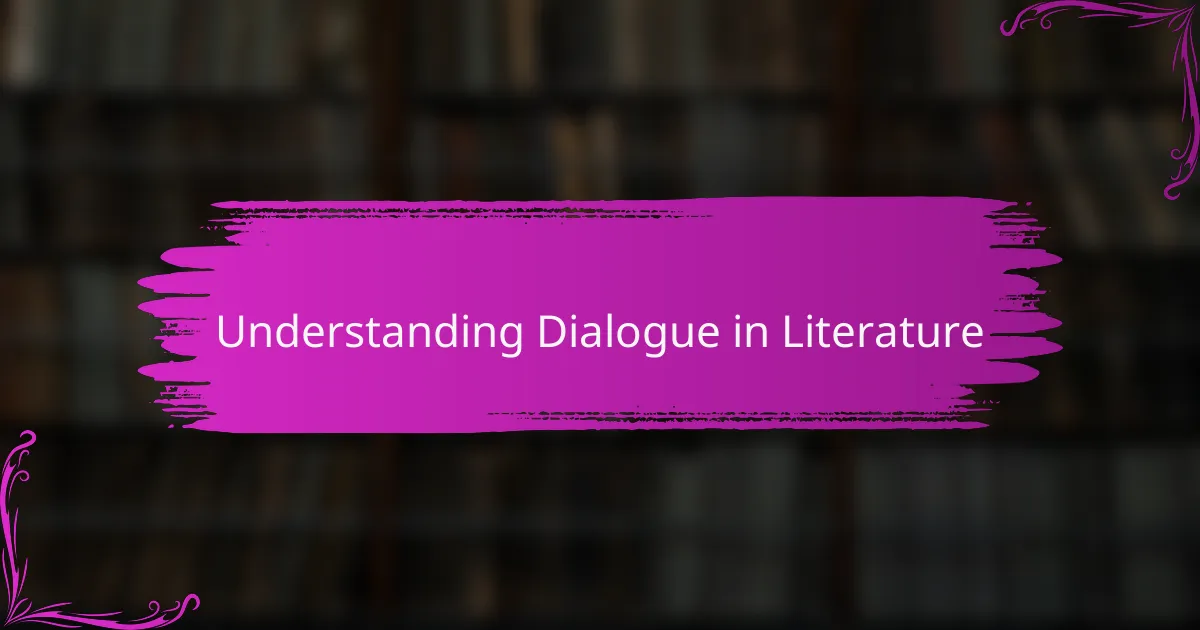
Understanding Dialogue in Literature
Understanding dialogue in literature is crucial because it breathes life into characters and propels the story forward. I remember attending a workshop where we dissected classic novels, focusing on how authors use dialogue to reveal character motivations and tensions. It made me realize that every line spoken carries weight; it doesn’t just represent words, but emotions, histories, and unspoken thoughts.
I often ponder why dialogue sometimes feels forced in new writers’ work. In my own experience, I’ve found that authenticity is key. When I incorporate my own speech patterns and experiences into the dialogue I write, it resonates more with readers. Have you ever read a conversation that felt so real you could almost hear the voices? That’s the power of genuine dialogue—it’s a bridge that connects readers to characters.
In workshops, we practiced writing dialogue that does more than just convey information. Instead, we learned to layer subtext and conflict, creating interactions that are rich and dynamic. There’s a certain thrill in crafting a scene where what isn’t said matters just as much as what is. It’s in those moments of silence, hesitation, or double meanings where the dialogue truly shines and reveals deeper truths about the characters.
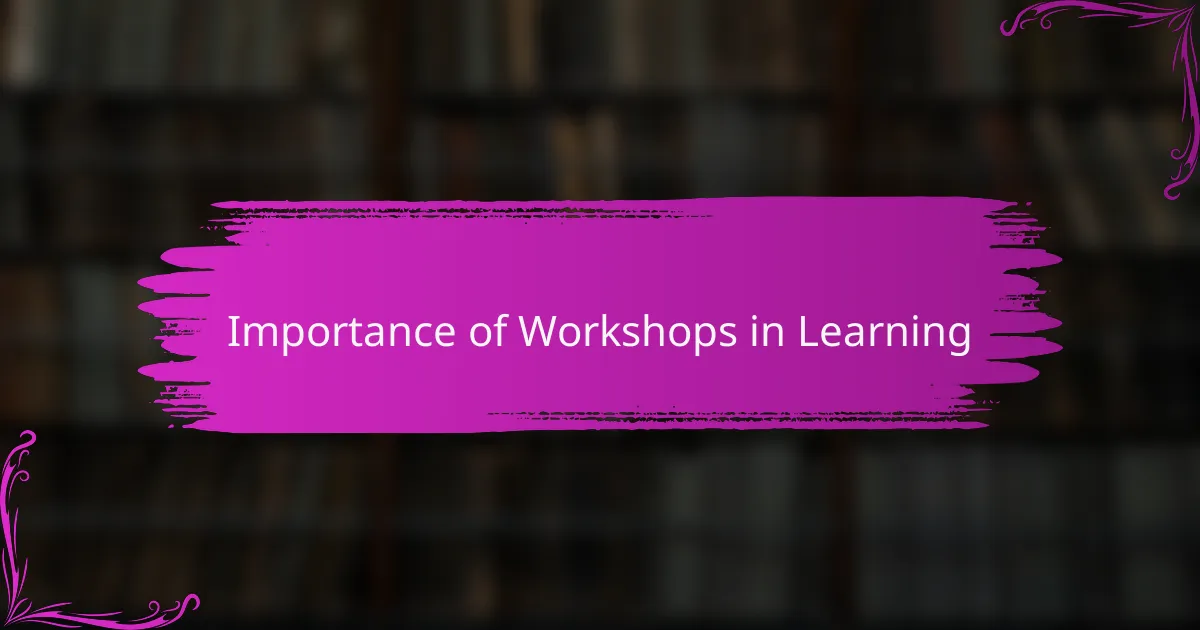
Importance of Workshops in Learning
Participating in workshops is an eye-opening experience that often reshapes my understanding of storytelling. I vividly recall a session where we were tasked with rewriting a mundane conversation, transforming it into an engaging piece through careful attention to emotion and intent. This exercise taught me that every word choice matters, shaping both the voice of the character and the direction of the plot.
What I cherish most about workshops is the collaborative environment they foster. I remember one particular discussion where a fellow participant pointed out the subtext in a piece I had written. Their insight encouraged me to dig deeper into the motivations of my characters, ultimately leading to a richer narrative. Isn’t it fascinating how another perspective can turn a decent piece into something extraordinary?
Workshops are not just about theory; they offer practical applications of what we learn. In one memorable activity, we broke into pairs, acting out scenes and adjusting our dialogues based on feedback from our partners. This dynamic practice not only honed my skills but also reminded me that learning is often a collective journey. Isn’t it amazing how sharing our voices can elevate the stories we tell?
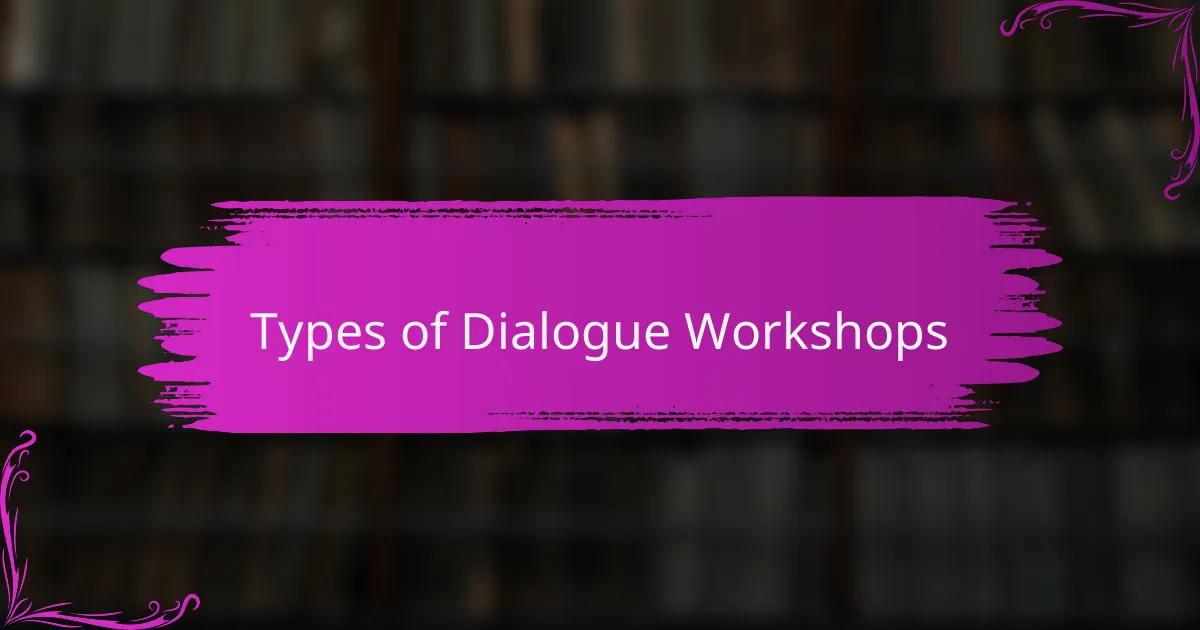
Types of Dialogue Workshops
When it comes to honing dialogue skills, I’ve found that different types of workshops cater to various aspects of writing. For instance, scriptwriting workshops immerse you in character-driven dialogues, helping you understand subtext and emotional undertones. In contrast, poetry dialogues often explore brevity and rhythm, making every word pack a punch.
I recall participating in a workshop focused solely on improvisational dialogue. The spontaneity of it was exhilarating! We were encouraged to respond quickly and authentically to our partners. This practice not only sharpened my wit, but it also deepened my understanding of how dialogue functions in real-time communication.
Below is a simple comparison table that highlights various types of dialogue workshops I’ve encountered over the years:
| Workshop Type | Focus Area |
|---|---|
| Scriptwriting | Character and Emotional Depth |
| Poetry | Brevity and Rhythm |
| Improvisational | Spontaneity and Authenticity |
| Fiction | Character Development and Plot Integration |
| Playwriting | Stage Dynamics and Realism |
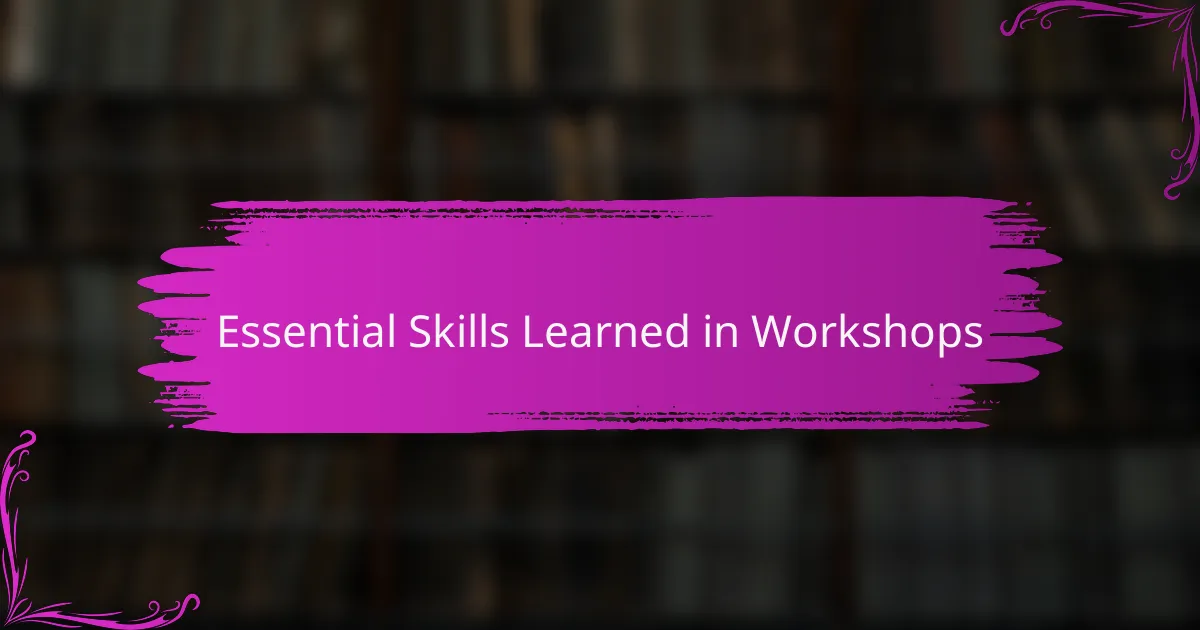
Essential Skills Learned in Workshops
When I participated in dialogue workshops, I quickly realized how essential active listening is. It’s not just about waiting for your turn to speak; it’s about immersing yourself in what others are saying. I remember a moment when a fellow participant shared a personal story, and the way I responded helped deepen the connection. That experience taught me that dialogue is a dance—a balance of listening and responding authentically.
Another crucial skill I acquired was the art of concise expression. In workshops, I struggled initially with lengthy explanations, but I found that simplicity often packs the most punch. One exercise included transforming a long monologue into a snappy exchange, which turned out to be a revelation for me. It was empowering to realize that powerful dialogue often lies in brevity.
Emotional resonance also emerged as a significant focus in these sessions. Learning to convey emotions through dialogue elevated the impact of the characters I created. In one workshop, we partnered up to perform scenes, and I could feel the audience’s reactions shift with our delivery. That was a pivotal moment for me, one that stressed the importance of emotion in every exchange.
| Essential Skills | Details |
|---|---|
| Active Listening | Engaging fully with others’ words, leading to deeper connections. |
| Concise Expression | Crafting dialogue that is clear and impactful, avoiding unnecessary length. |
| Emotional Resonance | Conveying feelings effectively to enhance character dynamics and audience connection. |
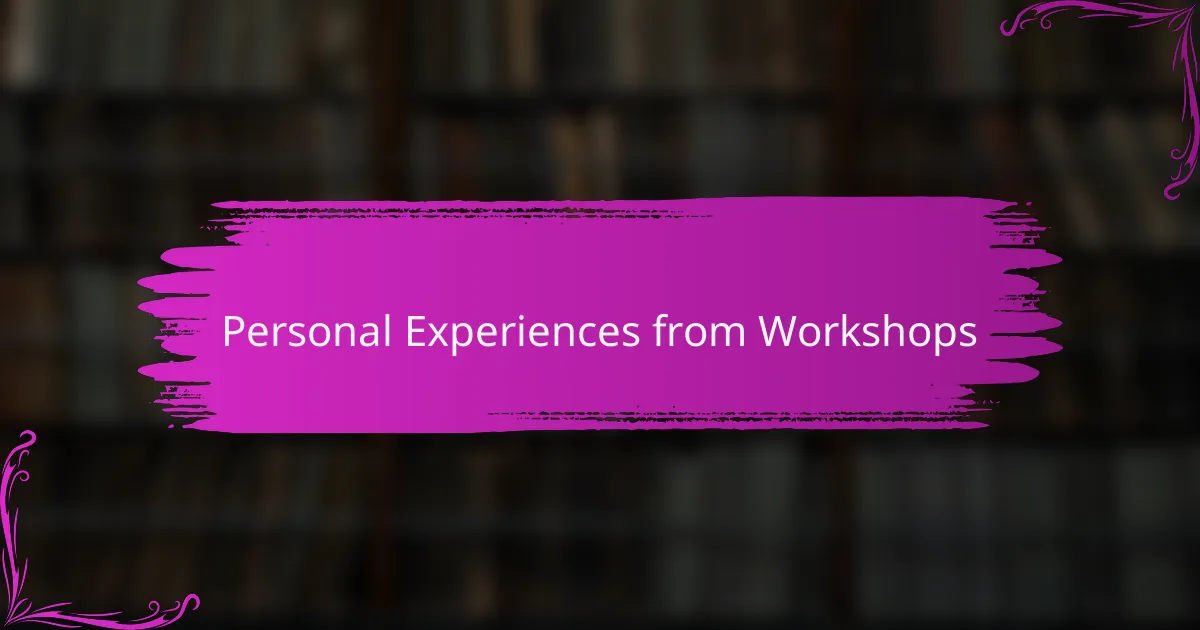
Personal Experiences from Workshops
Participating in workshops opened my eyes to the intricacies of dialogue. For instance, during a recent session, we role-played various characters, which really helped me understand how tone and voice influence conversations. I still remember the thrill of delivering a line perfectly, and the applause that followed felt incredibly validating.
In another workshop, we explored character backstory and its impact on dialogue. Sharing my character’s struggles made the feedback more meaningful; it felt like a mini-therapy session where everyone understood my character’s journey. The connection with fellow writers brought a level of emotional depth to our work that I hadn’t expected.
Here’s a comparison of different workshops I attended, highlighting the key aspects of my learning experience:
| Workshop | Focus Area |
|---|---|
| Character Development | Understanding backstory’s influence on dialogue |
| Improvisation Techniques | Spontaneity in character interactions |
| Feedback Sessions | Emotional resonance in dialogue delivery |
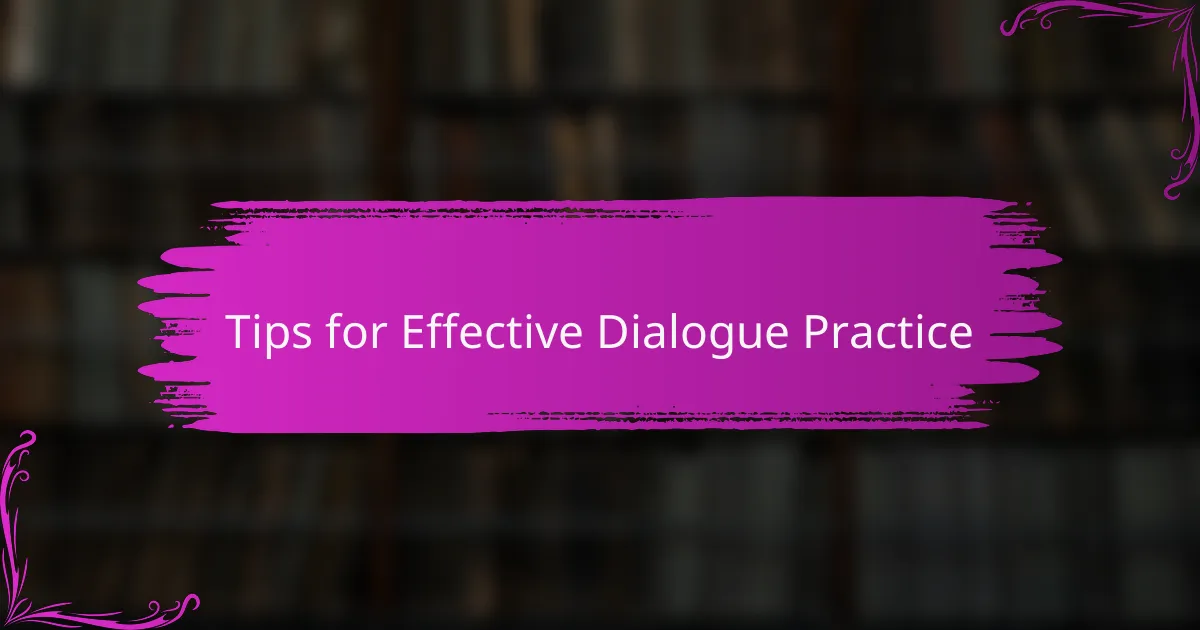
Tips for Effective Dialogue Practice
When it comes to practicing dialogue, I’ve found that immersing myself in various scenarios makes a huge difference. I recall attending a workshop where we paired up and role-played different characters in a scene—the energy in the room was electric. This hands-on practice not only helped me hear the rhythm of real conversations but also allowed me to experiment with different voices and tones, which is something I now consider essential.
Effective dialogue practice involves several key strategies that can transform your skills. Here are some tips I’ve gathered along the way:
- Listen Actively: Pay attention to how people speak in everyday life. Take mental notes about their tone, pauses, and expressions.
- Read Aloud: Don’t just read dialogue silently; hearing it can help you grasp how it flows.
- Workshop Feedback: Share your work with others and ask for constructive criticism. It can reveal blind spots you hadn’t considered.
- Experiment with Emotion: Try writing the same line in different emotional states to see how it changes the delivery.
- Keep it Natural: Focus on making your dialogue sound authentic. Read it out loud to ensure it feels realistic.
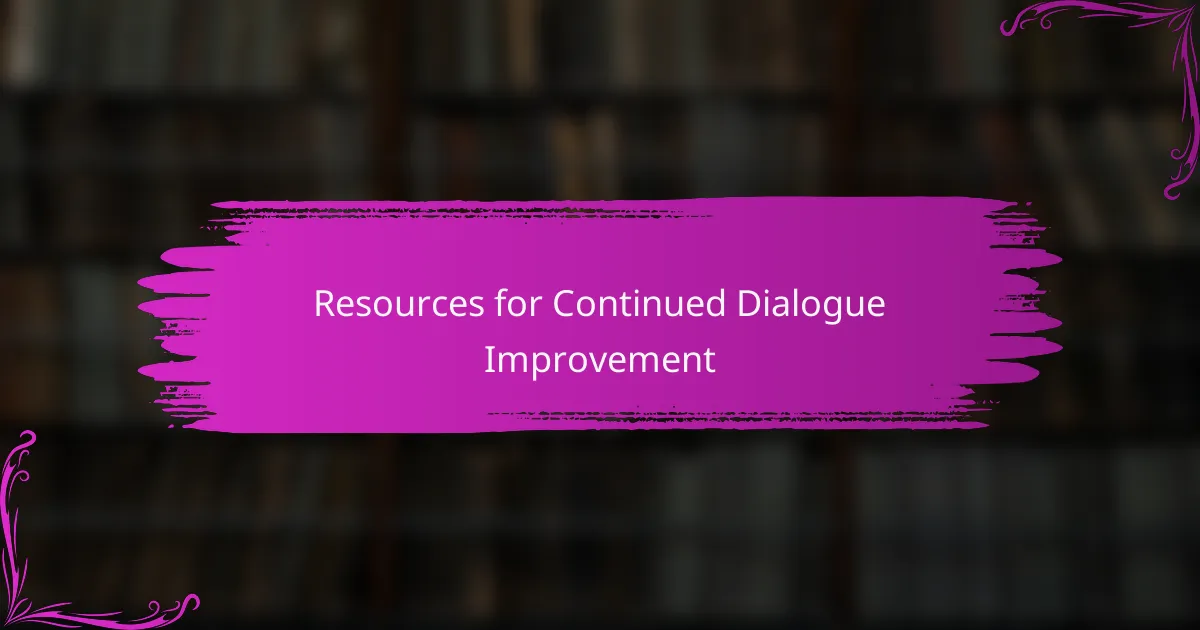
Resources for Continued Dialogue Improvement
When it comes to improving dialogue skills, there are countless resources available that can take your writing to the next level. I’ve found that attending workshops not only provides valuable techniques but also connects you with fellow writers who share your passion. The sense of community in these settings is invigorating, and the feedback received can be transformative.
In addition to workshops, reading books on dialogue crafting and practicing writing prompts can greatly enhance your skills. I remember picking up a book that focused solely on dialogue techniques, and it felt like a light bulb moment—everything clicked, and my characters finally started sounding like they were having real conversations rather than just exchanging information.
Overall, continually seeking resources ensures that I never stop learning. It’s a journey, and upgrading my toolbox with fresh ideas keeps the writing process exciting and fruitful.
| Resource Type | Description |
|---|---|
| Workshops | Interactive sessions that offer real-time feedback and community support. |
| Books | Guides and handbooks filled with techniques and examples of engaging dialogue. |
| Online Courses | Structured programs that provide step-by-step training and exercises at your own pace. |
| Writing Prompts | Creative exercises to inspire new dialogue ideas and challenge your skill. |
